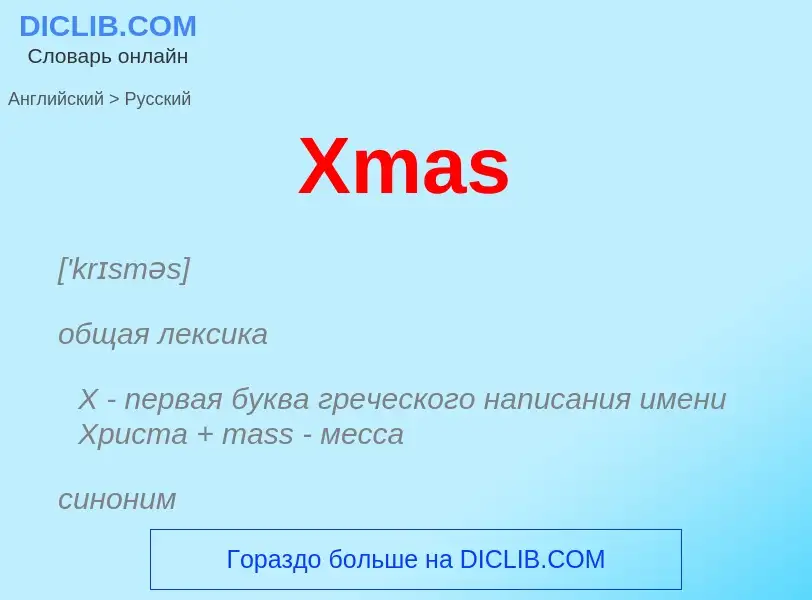Translation and analysis of words by ChatGPT artificial intelligence
On this page you can get a detailed analysis of a word or phrase, produced by the best artificial intelligence technology to date:
- how the word is used
- frequency of use
- it is used more often in oral or written speech
- word translation options
- usage examples (several phrases with translation)
- etymology
Xmas - translation to russian
['krɪsməs]
общая лексика
X - первая буква греческого написания имени Христа + mass - месса
синоним
существительное
общая лексика
([сокр.] от Christmas)
Рождество
синоним
['krɪsməs]
общая лексика
Рождество (25 декабря; главный церковный и светский праздник года; к этому дню по традиции обмениваются подарками и рождественскими открытками, украшают ёлку, устраивают вечера и рождественские представления для детей. 25 и 26 декабря - официальные выходные дни; рождественские святки отмечаются с середины декабря до 6 января [Twelfth night])
синоним
существительное
общая лексика
рождественский
церковное выражение
рождество (Христово)
синоним
Definition
Wikipedia

Xmas (also X-mas) is a common abbreviation of the word Christmas. It is sometimes pronounced , but Xmas, and variants such as Xtemass, originated as handwriting abbreviations for the typical pronunciation . The 'X' comes from the Greek letter Chi, which is the first letter of the Greek word Christós (Greek: Χριστός, translit. Khristós, lit. "anointed, covered in oil"), which became Christ in English. The suffix -mas is from the Latin-derived Old English word for Mass.
There is a common misconception that the word Xmas stems from a secularizing tendency to de-emphasize the religious tradition from Christmas, by "taking the Christ out of Christmas"; nevertheless, the term's usage dates back to the 16th century, and corresponds to Roman Catholic, Eastern Orthodox, Church of England, and Episcopalian liturgical use of various forms of chi-rho monogram. In English, "X" was first used as a scribal abbreviation for "Christ" in 1100; "X'temmas" is attested in 1551, and "Xmas" in 1721.




![Jackie]]. Jackie]].](https://commons.wikimedia.org/wiki/Special:FilePath/1962 Entrance Hall (Official White House) Christmas tree - Jack and Jacqueline Kennedy.jpg?width=200)
![A Norwegian Christmas, 1846 painting by [[Adolph Tidemand]] A Norwegian Christmas, 1846 painting by [[Adolph Tidemand]]](https://commons.wikimedia.org/wiki/Special:FilePath/Adolph Tidemand Norsk juleskik.jpg?width=200)
![On Christmas, the Christ Candle in the center of the [[Advent wreath]] is traditionally lit in many [[church service]]s. On Christmas, the Christ Candle in the center of the [[Advent wreath]] is traditionally lit in many [[church service]]s.](https://commons.wikimedia.org/wiki/Special:FilePath/Advent Wreath (Broadway United Methodist Church).jpg?width=200)
![page=[https://archive.org/details/moscowmadness00timo/page/72 72] }}</ref> page=[https://archive.org/details/moscowmadness00timo/page/72 72] }}</ref>](https://commons.wikimedia.org/wiki/Special:FilePath/Bezbozhnik u stanka - Run along, Lord, 1931, n. 22.jpg?width=200)
![Christmas carolers in [[Jersey]] Christmas carolers in [[Jersey]]](https://commons.wikimedia.org/wiki/Special:FilePath/Chant'tie d'Cantiques dé Noué Dézembre 2009 Jèrri a.jpg?width=200)
![Children in Oklahoma reenact a [[Nativity play]] Children in Oklahoma reenact a [[Nativity play]]](https://commons.wikimedia.org/wiki/Special:FilePath/Childrens Nativity Play 2007.jpg?width=200)
![Mosaic in Mausoleum M in the pre-fourth-century necropolis under [[St Peter's Basilica]] in Rome, interpreted by some as Jesus represented as ''Christus Sol'' (Christ the Sun).<ref>Kelly, Joseph F., ''The Origins of Christmas'', Liturgical Press, 2004, pp. 67–69.</ref> Mosaic in Mausoleum M in the pre-fourth-century necropolis under [[St Peter's Basilica]] in Rome, interpreted by some as Jesus represented as ''Christus Sol'' (Christ the Sun).<ref>Kelly, Joseph F., ''The Origins of Christmas'', Liturgical Press, 2004, pp. 67–69.</ref>](https://commons.wikimedia.org/wiki/Special:FilePath/ChristAsSol.jpg?width=200)
![[[Christmas market]] in [[Jena]], Germany [[Christmas market]] in [[Jena]], Germany](https://commons.wikimedia.org/wiki/Special:FilePath/ChristmasMarketJena.jpg?width=200)
![[[Christmas dinner]] setting [[Christmas dinner]] setting](https://commons.wikimedia.org/wiki/Special:FilePath/Christmas Dinner Setting.jpg?width=200)
![Annunciation Church]] in Nazareth, 1965 Annunciation Church]] in Nazareth, 1965](https://commons.wikimedia.org/wiki/Special:FilePath/Christmas at the Church of the Annunciation, Nazareth, 1965.jpg?width=200)
![Santa]] and some of his reindeer Santa]] and some of his reindeer](https://commons.wikimedia.org/wiki/Special:FilePath/Christmas postcard 1907.jpg?width=200)
.jpg?width=200)
![Old Father Christmas]]'', (1686), published after Christmas was reinstated as a holy day in England Old Father Christmas]]'', (1686), published after Christmas was reinstated as a holy day in England](https://commons.wikimedia.org/wiki/Special:FilePath/FatherChristmastrial.jpg?width=200)
![Christmas decorations at the [[Galeries Lafayette]] department store in Paris, France. The Christmas season is the busiest trading period for retailers. Christmas decorations at the [[Galeries Lafayette]] department store in Paris, France. The Christmas season is the busiest trading period for retailers.](https://commons.wikimedia.org/wiki/Special:FilePath/Galerie Lafayette Haussmann Dome.jpg?width=200)
![''Adoration of the Shepherds'' (1622) by [[Gerard van Honthorst]] depicts the nativity of Jesus ''Adoration of the Shepherds'' (1622) by [[Gerard van Honthorst]] depicts the nativity of Jesus](https://commons.wikimedia.org/wiki/Special:FilePath/Gerard van Honthorst - Adoration of the Shepherds (1622).jpg?width=200)


![money supply in US banks]] is increased for Christmas shopping money supply in US banks]] is increased for Christmas shopping](https://commons.wikimedia.org/wiki/Special:FilePath/Monthly Changes in Currency.jpg?width=200)
![Neapolitan]] ''presepe'' or ''presepio'', or Nativity scene. Local crèches are renowned for their ornate decorations and symbolic figurines, often mirroring daily life. Neapolitan]] ''presepe'' or ''presepio'', or Nativity scene. Local crèches are renowned for their ornate decorations and symbolic figurines, often mirroring daily life.](https://commons.wikimedia.org/wiki/Special:FilePath/Nacimiento napolitano.jpg?width=200)
![Saint Andrei Rublev]], 15th century Saint Andrei Rublev]], 15th century](https://commons.wikimedia.org/wiki/Special:FilePath/Nativity (15th c., Annunciation Cathedral in Moscow).jpg?width=200)
![''The Nativity'', from a 14th-century [[Missal]]; a liturgical book containing texts and music necessary for the celebration of Mass throughout the year ''The Nativity'', from a 14th-century [[Missal]]; a liturgical book containing texts and music necessary for the celebration of Mass throughout the year](https://commons.wikimedia.org/wiki/Special:FilePath/Nativity from Sherbrooke Missal cropped.jpg?width=200)
![[[Ebenezer Scrooge]] and the [[Ghost of Christmas Present]]. From [[Charles Dickens]]' ''[[A Christmas Carol]]'', 1843. [[Ebenezer Scrooge]] and the [[Ghost of Christmas Present]]. From [[Charles Dickens]]' ''[[A Christmas Carol]]'', 1843.](https://commons.wikimedia.org/wiki/Special:FilePath/Scrooges third visitor-John Leech,1843 edit.jpg?width=200)

![Child singers in [[Bucharest]], 1841 Child singers in [[Bucharest]], 1841](https://commons.wikimedia.org/wiki/Special:FilePath/Steaua, Bucharest, 1842 crop.jpg?width=200)
![The Queen's Christmas tree at [[Windsor Castle]], published in the ''Illustrated London News'', 1848 The Queen's Christmas tree at [[Windsor Castle]], published in the ''Illustrated London News'', 1848](https://commons.wikimedia.org/wiki/Special:FilePath/The Christmas Tree at Windsor Castle, by J. L. Williams - ILN 1848 (cropped).jpg?width=200)

